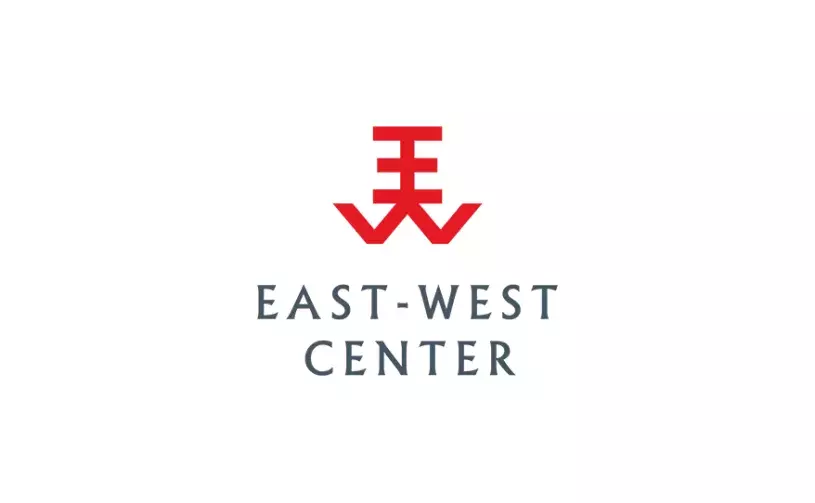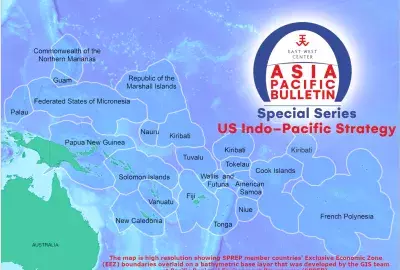Error message

|
Richard K. Pruett, Senior Consultant with the Stevenson Group, Washington, D.C., explains that “The Compact nations receive U.S. bilateral economic assistance on a per capita basis higher than any other country, including Israel.” |
A Compact of Free Association (COFA) with the Republic of Kiribati would strengthen the U.S. strategic posture in the Pacific, win the moral high ground in the global climate change debate, and strengthen Washington's diplomatic footing in Pacific regional architecture, while giving Kiribati strong defense guarantees, generous immigration terms, and modest development assistance.
Kiribati is a Pacific Micronesian country, as are Nauru and the Freely Associated States (FAS), consisting of Palau, Micronesia, and the Marshall Islands. The three FAS countries were administered during the post-war period by the United States in trusteeship for the United Nations (UN), but none was ever a U.S. colony. Each is now a sovereign country and full UN member. The U.S. compacts with the FAS are international treaties with force in U.S. law equal to the Constitution.
Under the legal terms of the Compacts, the FAS countries are America's closest allies, because the Compacts mandate the United States by law to defend these countries and their citizens as it would U.S. territory and its own citizens. They require the United States to provide consular services to FAS citizens abroad in the many countries where they have no diplomatic mission of their own. Remarkably, the Compacts allow FAS citizens to visit, work, and establish residency in the United States without visas. They even bring these countries inside the U.S. postal system, assigning them separate zip codes and charging only domestic mail rates. The U.S. Coast Guard patrols their Exclusive Economic Zones, which range into millions of nautical miles. FAS citizens may enlist in the U.S. military, and, in fact, do enlist at rates much higher than the U.S. national average. And the Compact nations receive U.S. bilateral economic assistance on a per capita basis higher than any other country, including Israel.
In return, the FAS countries yield to the United States the management of their external defense. As a practical matter, FAS governments retain control of their foreign policies but must regularly consult with Washington to ensure those policies do not undercut or conflict with the U.S. defense role. In a similar vein, U.S. defense of FAS countries includes the concomitant and explicit right to deny the transit of warships or basing of forces from other countries. Nonetheless, the FAS countries continue to pursue independent foreign policies — as evidenced by the diplomatic relations the Marshall Islands and Palau maintain with Taipei, while Micronesia not only recognizes Beijing but is hailed as its model for bilateral relations with Pacific Island countries.
Although many in Palau and Ulithi Atoll in Yap, Micronesia, continually express their desire for U.S. bases, the only U.S. military facility in the FAS is the Ronald Reagan Ballistic Missile Defense Test Site. Located at Kwajalein in the Marshall Islands, this $4 billion facility is important to U.S. national security for tracking ballistic missile tests and other reasons.
Rumors that Beijing and/or Moscow seek naval bases in the Pacific have not been borne out to date. From 1997 to 2003, the PRC maintained a satellite tracking station in Kiribati. As China's only offshore satellite facility, the station was important to Beijing's space program and perhaps for monitoring Kwajalein and U.S. missile tests. Beijing lost the station when Kiribati switched diplomatic recognition from Beijing to Taipei in 2003. Kiribati’s new president recently reversed this policy, reportedly in consideration for funding for airplanes and commercial ferries.
A COFA like those between the United States and the FAS would allow the United States to exercise direct military control over Kiribati's large Exclusive Economic Zones, one of which is contiguous with the U.S. EEZ around Hawaii, thereby adding to America's defense in depth by denying military access to Kiribati by another power, bolstering U.S.-Kiribati law enforcement, helping to combat transnational crime, and creating new options for the exercise of U.S. military power.
A U.S.-Kiribati COFA would broaden and strengthen the U.S.-affiliated Pacific Island countries (USAPI), giving this bloc greater clout in intergovernmental organizations and Pacific regional architecture. A COFA would allow the United States to expand and further consolidate the FAS as a political construct, helping to counteract the secessionist pressures that threaten the linchpin of the FAS, Micronesia, with national dissolution. It would serve as a vehicle for reintegrating the 100,000 I-Kiribati with their Micronesian neighbors. A COFA with Kiribati might even spur Nauru and/or even the Philippines to consider free association. During its Commonwealth years (1935-46), the Philippines was America’s first Associated State. Free association would propel the Philippines to the leadership of this diplomatic bloc.
The true value of the deal to Kiribati would be in the immigration status that free association might bring. I-Kiribati who found conditions no longer tolerable in Kiribati might be able to relocate to the United States. These would not be large numbers in absolute terms; likely most I-Kiribati would choose not to emigrate. A small increase in Federal Compact Impact assistance funding to Guam and Hawaii would need to offset any negative immigration impacts. But the impact could also be positive. The FAS and America’s Pacific territories are easily the most productive recruiting grounds for the U.S. military, and improved educational standards in the islands could make them doubly so. Because the immigration terms of the Compacts are reciprocal, Americans could be free to travel, live, and work in Kiribati without visas.
The cost to the United States likely would be modest in terms of development assistance – perhaps $10 million a year in bilateral assistance and an additional $3 million in federal Compact Impact funding. The economic aid could help Kiribati upgrade Bonriki International Airport in Tarawa, perhaps allowing the U.S. Peace Corps to return and enabling more air travel among Micronesian nations.
The value of the deal to Washington would be deeper influence over Kiribati’s EEZ and within regional and international organizations – not just on issues related to climate change but on the full range of issues touching on the national interests of the USAPI.
The U.S. variant of free association formally underscores the sovereignty of its parties, even as it deliberately integrates aspects of their relationship for the purpose of defending that sovereignty. That integration can grow over time, if the parties prefer, or remain as limited as they wish. Even a republican form of government, as guaranteed by the U.S. Constitution to each U.S. state, is not a prerequisite for free association. It is, however, an organizing principle already adopted by the government and people of Kiribati — a shared principle the United States, the FAS, and Kiribati can best defend collectively, in strong alliance and free association.
|
Richard K. Pruett, Senior Consultant with the Stevenson Group, Washington, D.C., explains that “The Compact nations receive U.S. bilateral economic assistance on a per capita basis higher than any other country, including Israel.” |
A Compact of Free Association (COFA) with the Republic of Kiribati would strengthen the U.S. strategic posture in the Pacific, win the moral high ground in the global climate change debate, and strengthen Washington's diplomatic footing in Pacific regional architecture, while giving Kiribati strong defense guarantees, generous immigration terms, and modest development assistance.
Kiribati is a Pacific Micronesian country, as are Nauru and the Freely Associated States (FAS), consisting of Palau, Micronesia, and the Marshall Islands. The three FAS countries were administered during the post-war period by the United States in trusteeship for the United Nations (UN), but none was ever a U.S. colony. Each is now a sovereign country and full UN member. The U.S. compacts with the FAS are international treaties with force in U.S. law equal to the Constitution.
Under the legal terms of the Compacts, the FAS countries are America's closest allies, because the Compacts mandate the United States by law to defend these countries and their citizens as it would U.S. territory and its own citizens. They require the United States to provide consular services to FAS citizens abroad in the many countries where they have no diplomatic mission of their own. Remarkably, the Compacts allow FAS citizens to visit, work, and establish residency in the United States without visas. They even bring these countries inside the U.S. postal system, assigning them separate zip codes and charging only domestic mail rates. The U.S. Coast Guard patrols their Exclusive Economic Zones, which range into millions of nautical miles. FAS citizens may enlist in the U.S. military, and, in fact, do enlist at rates much higher than the U.S. national average. And the Compact nations receive U.S. bilateral economic assistance on a per capita basis higher than any other country, including Israel.
In return, the FAS countries yield to the United States the management of their external defense. As a practical matter, FAS governments retain control of their foreign policies but must regularly consult with Washington to ensure those policies do not undercut or conflict with the U.S. defense role. In a similar vein, U.S. defense of FAS countries includes the concomitant and explicit right to deny the transit of warships or basing of forces from other countries. Nonetheless, the FAS countries continue to pursue independent foreign policies — as evidenced by the diplomatic relations the Marshall Islands and Palau maintain with Taipei, while Micronesia not only recognizes Beijing but is hailed as its model for bilateral relations with Pacific Island countries.
Although many in Palau and Ulithi Atoll in Yap, Micronesia, continually express their desire for U.S. bases, the only U.S. military facility in the FAS is the Ronald Reagan Ballistic Missile Defense Test Site. Located at Kwajalein in the Marshall Islands, this $4 billion facility is important to U.S. national security for tracking ballistic missile tests and other reasons.
Rumors that Beijing and/or Moscow seek naval bases in the Pacific have not been borne out to date. From 1997 to 2003, the PRC maintained a satellite tracking station in Kiribati. As China's only offshore satellite facility, the station was important to Beijing's space program and perhaps for monitoring Kwajalein and U.S. missile tests. Beijing lost the station when Kiribati switched diplomatic recognition from Beijing to Taipei in 2003. Kiribati’s new president recently reversed this policy, reportedly in consideration for funding for airplanes and commercial ferries.
A COFA like those between the United States and the FAS would allow the United States to exercise direct military control over Kiribati's large Exclusive Economic Zones, one of which is contiguous with the U.S. EEZ around Hawaii, thereby adding to America's defense in depth by denying military access to Kiribati by another power, bolstering U.S.-Kiribati law enforcement, helping to combat transnational crime, and creating new options for the exercise of U.S. military power.
A U.S.-Kiribati COFA would broaden and strengthen the U.S.-affiliated Pacific Island countries (USAPI), giving this bloc greater clout in intergovernmental organizations and Pacific regional architecture. A COFA would allow the United States to expand and further consolidate the FAS as a political construct, helping to counteract the secessionist pressures that threaten the linchpin of the FAS, Micronesia, with national dissolution. It would serve as a vehicle for reintegrating the 100,000 I-Kiribati with their Micronesian neighbors. A COFA with Kiribati might even spur Nauru and/or even the Philippines to consider free association. During its Commonwealth years (1935-46), the Philippines was America’s first Associated State. Free association would propel the Philippines to the leadership of this diplomatic bloc.
The true value of the deal to Kiribati would be in the immigration status that free association might bring. I-Kiribati who found conditions no longer tolerable in Kiribati might be able to relocate to the United States. These would not be large numbers in absolute terms; likely most I-Kiribati would choose not to emigrate. A small increase in Federal Compact Impact assistance funding to Guam and Hawaii would need to offset any negative immigration impacts. But the impact could also be positive. The FAS and America’s Pacific territories are easily the most productive recruiting grounds for the U.S. military, and improved educational standards in the islands could make them doubly so. Because the immigration terms of the Compacts are reciprocal, Americans could be free to travel, live, and work in Kiribati without visas.
The cost to the United States likely would be modest in terms of development assistance – perhaps $10 million a year in bilateral assistance and an additional $3 million in federal Compact Impact funding. The economic aid could help Kiribati upgrade Bonriki International Airport in Tarawa, perhaps allowing the U.S. Peace Corps to return and enabling more air travel among Micronesian nations.
The value of the deal to Washington would be deeper influence over Kiribati’s EEZ and within regional and international organizations – not just on issues related to climate change but on the full range of issues touching on the national interests of the USAPI.
The U.S. variant of free association formally underscores the sovereignty of its parties, even as it deliberately integrates aspects of their relationship for the purpose of defending that sovereignty. That integration can grow over time, if the parties prefer, or remain as limited as they wish. Even a republican form of government, as guaranteed by the U.S. Constitution to each U.S. state, is not a prerequisite for free association. It is, however, an organizing principle already adopted by the government and people of Kiribati — a shared principle the United States, the FAS, and Kiribati can best defend collectively, in strong alliance and free association.







